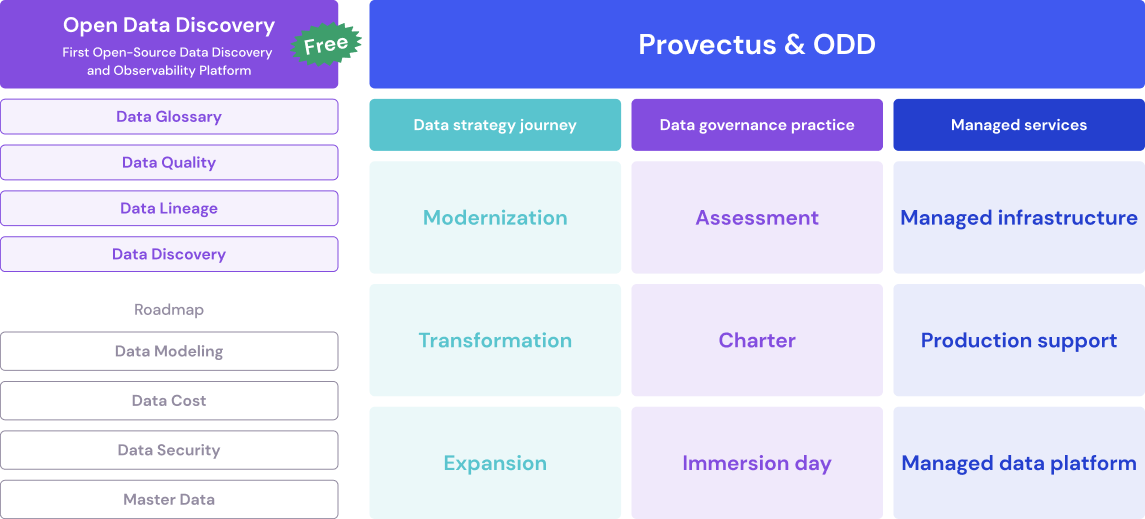Data Governance Services
Amplify your business initiatives and operations by making data easily available to your teams and applications while keeping it safe and secure
Gartner predicts that by 2025, 80% of organizations that seek to reinvent and expand their business through Digital and AI transformations will falter due to the outdated approach to data governance. Chief Data Officers (CDOs) also recognize this, with an MIT CDOIQ survey revealing that 45% of respondents are looking to democratize data while keeping safety controls in place.
At Provectus, we recognize that a modern data governance practice should balance data access with control. Excessive control leads to data silos and shadow IT systems, compromising data integrity and security. Excessive access runs the risk of data leaks. Provectus’ Data Governance Services help maintain a perfect balance, instilling trust in data while facilitating innovation and ensuring data protection.
Data governance is a comprehensive set of methodologies and standards for managing data throughout its lifecycle. It impacts the people handling and using data, the processes they adhere to, and the tools they utilize.
Data governance is not the domain of a single department. It is vital for every division of your organization. To successfully propel data governance best practices into action, it is important to focus on the following key aspects.
Reflecting on the evolution and growing complexity of data environments, it is clear that data governance is more than just a set of policies or security measures. It is a dynamic strategy aimed at ensuring data integrity, usability, and value across an organization. This comprehensive approach becomes even more crucial as we consider the diverse and sophisticated challenges in today's data governance landscape.
Provectus provides a cutting-edge data governance framework that enables
enterprises to unlock the value of data across all eight aspects,
organization-wide.
The practice of data governance at Provectus is much more than just a set of policies and security measures. It is a dynamic and proactive strategy for ensuring the integrity, usability, and at-scale value of data across your organization.
The Provectus framework for data governance addresses major challenges that impede an organization's ability to utilize a modern data stack in ever-evolving business and technology environments.
The cloud presents vast opportunities for effectively addressing data governance challenges and accelerating development and decision-making. While businesses should embrace the cloud, they must also acknowledge and adapt to its unique challenges with innovative approaches, skills, and tools.
The advancement of AI/ML, particularly Generative AI, underscores data as
a key business differentiator, elevating the significance of data governance
in the cloud.
Data governance serves as a catalyst for achieving data- and AI-driven objectives, executing competitive strategies, and creating business
value at scale. We provide a suite of solutions tailored to assist organizations at various stages of their data maturity journey.
Data Strategy Development
into three distinct segments:

Data Transformation: Enhancing data platforms and advancing data maturity.
Data Expansion: Broadening data platform capabilities and maturing processes in data management.
Data Modernization: Transitioning from traditional to modern cloud-based data infrastructures.
With over 13 years of expertise, Provectus guides businesses through every stage, each requiring tailored approaches — from preserving governance during modernization to introducing innovative tools in transformation, and broadening features in expansion.
The end goal is an AI-driven intelligent data platform, enabling smarter, more strategic operations through advanced solutions like Command Centers, Control Towers, and Digital Twins.
Data Governance Foundation
every project, focusing on processes, people, and tools:

Processes: Tailored for each organization, our process management involves stakeholder agreement, clear responsibility chains, and custom strategies for different stages of data strategy — modernization, transformation, and expansion. Key aspects include integrating experts early, training, maintaining governance standards, adjusting to new requirements, and expanding governance as the business grows.
People: We emphasize the connection between policy-makers, business implementers, and technical executors. With extensive experience in data and AI-driven solutions, we help streamline processes, develop data strategies, and implement governance practices. Our expertise spans five integrated practices: Data, Machine Learning, Data Quality, DevOps, and General Application Development.
Tools: Provectus is dynamic and unbiased in tool selection, focusing on the best fit for business challenges. We have developed tools like Open Data Discovery (ODD), Kafka UI, Swiss Army Kube, and Data Quality Gate, and contribute to platforms like Great Expectations and Feast.
Provectus's approach is marked by customizability, strategic alignment with business goals, and a commitment to open-source contributions.
Data Governance Practice Assessment
assess their strategy. Provectus can conduct such assessments, helping to set
up the correct processes, train staff, and implement the right tools.

Processes:
- Assessment of data (data inventory and categorization)
- Exploring the mapping and migration strategy, figuring out data transformations
- Looking into data discovery and observability components
- Checking data integrity and data quality after migration, looking for silos, and ensuring continuous monitoring
- Ensuring that a feedback loop is in place, setting up mechanisms for feedback incorporation
- Assuring adherence to data governance principles and best practices
- In AI/ML use cases: Data cleaning routine, Feature store work, Version control, ML pipeline integration, and Monitoring & Maintenance
People:
- Data Stewards — implement and check organizational policies, oversee data quality and categorization, check for data relevance and consistency
- Data Architects — handle the data modeling work
- Data Engineers — manage data migrations and data transformations (processing, integration, etc.)
- Data Quality Engineers — ensure the accuracy, consistency, and reliability of data
- Data Scientists — engineer features, and adapt and align data for ML models
- AI/ML Engineers — design, build, train, and fine-tune systems using the data
- MLOps Engineers — integration of data components, ML pipelines, user applications, and more.
- DevOps & IT — help with the integration and utilization of a modern data stack, handling various technical challenges
- Business Analysts — offer insights on specific features and the overall performance of the system
- End-users & Stakeholders — provide feedback for the system
Tools:
- Cloud services from AWS, Microsoft Azure, GCP, Snowflake, Databricks, etc.
- Third-party, open-source solutions and tools for every aspect of the data governance maturity journey (e.g. Open Data Discovery ODD for data discovery, data glossary, data lineage, data quality and data modeling)
- MLOps platforms like MLflow, Kubeflow, and Provectus MLOps Platform
The Data Governance Charter serves as a blueprint for effective data governance, outlining roles, principles, and decision-making
frameworks. It offers a roadmap for achieving aligned, transparent, and efficient data governance.
Data Governance for AI/ML
governance in every AI/ML project, ranging from the development of AI
applications tailored to specific use cases, to ML infrastructure development,
and extensive AI transformations.

Our approach includes the following:
- Consideration of data governance is integrated into every AI/ML Transformation Canvas
- We prioritize security, ethical integrity, and unbiased approaches in AI/ML applications
- For specialized AI/ML solutions such as Retrieval-Augmented Generation (RAG) systems, key elements include managed routing, zero and few-shot prompting, data quality enrichment, and leveraging Knowledge Graphs.
Our Data Governance for RAG encompasses all eight key elements of data success in enterprises, ensuring that your AI/ML projects
are built on a solid, reliable data foundation that helps differentiate your business among the competition.
Managed Services for Data
Analytics department, or adopting AI/ML, is a continuous process that requires
ongoing support. Provectus offers a comprehensive suite of Managed Services
that cover every aspect of the data journey.

Managed Infrastructure: Our service simplifies cloud infrastructure management for your applications, ensuring top-notch performance, security, and cost-efficiency.
Production Support: We ensure optimal performance and reliability for your applications in production environments, minimizing potential disruptions.
Managed Data Platform: Our service streamlines the management of your data platform, guaranteeing unparalleled performance, robust security, and economical solutions.

